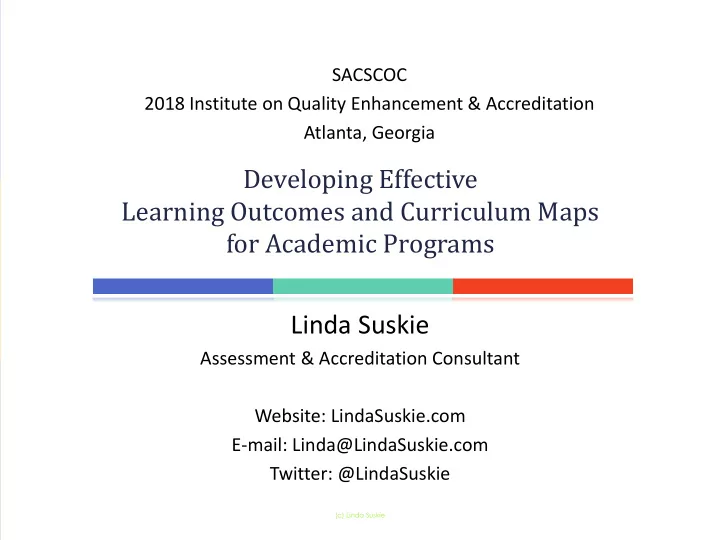

SACSCOC 2018 Institute on Quality Enhancement & Accreditation Atlanta, Georgia Developing Effective Learning Outcomes and Curriculum Maps for Academic Programs Linda Suskie Assessment & Accreditation Consultant Website: LindaSuskie.com E-mail: Linda@LindaSuskie.com Twitter: @LindaSuskie (c) Linda Suskie
We are taking our students on Learning Outcomes: What is their a journey. destination by the time they graduate? Curriculum & Learning Activities: How will your students get there? (c) Linda Suskie
What is a Program? ▪ More than a collection of courses ▪ A program has ▪ Coherence ▪ Depth ▪ Synthesis ▪ [Program] outcomes should be “practiced extensively, across the curriculum, in the context of progressively more challenging problems, projects, and standards for performance.” ▪ AAC&U (c) Linda Suskie
What is a Program Learning Outcome? ▪ The BIG things you want students to get out of a program ▪ Developed throughout the program, in at least 2 courses ▪ Not one faculty member’s sole responsibility (c) Linda Suskie
Why Are You Here? ▪ What do you need to learn today? ▪ Why? ▪ What do you want to be prepared to do when you get back to your office? ▪ How do you want to use what you’ll learn when you get back to your office? (c) Linda Suskie
(c) Linda Suskie
Good Learning Goals State Outcomes ▪ What students should be able to do AFTER they pass a course or graduate ▪ Solve natural resource management & protection issues. ▪ Develop critical and analytical thinking skills. (c) Linda Suskie
Good Learning Goals are Clear ▪ Students understand them. ▪ Colleagues understand them. ▪ No fuzzy terms! ▪ Improve food production in an era of global change. ▪ Communicate effectively. ▪ Be able to pursue independent research. (c) Linda Suskie
Good Learning Goals are Observable ▪ Action words ▪ If you can see it, you can assess it. ▪ Identify and analyze ethical issues in business. ▪ Find and develop their individual voices. (c) Linda Suskie
Good Learning Goals Focus on Skills Knowledge & Transferrable Habits Understanding Skills of Mind Career Attitudes Skills & Values • Communicate effectively with a range of audiences. • Discuss proper lab procedures. (c) Linda Suskie
Good Learning Goals are Relevant ▪ Meet important student & employer needs 5-10 years from now ▪ Teamwork and collaboration skills ▪ Articulating ideas clearly and effectively ▪ Real-world problem solving ▪ Evaluating information and conclusions ▪ Professionalism (habits of mind) ▪ Working with people from diverse cultural backgrounds ▪ Flexibility and adaptability to change ▪ Creativity and innovation ▪ Ethical judgment ▪ Using numbers, statistics & technology (c) Linda Suskie
Good Learning Goals are Rigorous Yet Realistic ▪ Identify, formulate, and solve technical problems. ▪ Be committed to professional and ethical practice, continuous improvement, and lifelong learning. (c) Linda Suskie
Good Learning Goals are Neither Too Broad nor Too Specific Too Too Just Right! Specific Broad Use a rubric to define broad goals. ▪ Evaluate [disciplinary] problems and hypotheses. ▪ Prepare for employment in [discipline]. ▪ Write a paper using [appropriate] sources to present a contextualized argument. (c) Linda Suskie
Time to Talk! ▪ Breakout Exercise #1 (c) Linda Suskie
Course Curriculum Mapping Students learn what they’re graded on. This is what This is what This is how you’ll you’ll learn to you’ll do to learn show me that do. it. you’ve learned it. 1. 2. 3. (c) Linda Suskie
This is what And this will This is what This is how you’ll learn help you learn you’ll do to you’ll show to do. how to… learn it. me that you’ve learned it. 1. [Program outcome] 2. 3. (c) Linda Suskie
Course learning outcomes help students achieve program learning outcomes. Program Course Articulate one’s Reflect on one’s progress & strengths and areas for development as a improvement as a practitioner in the practitioner of the skills discipline. developed in this course. (c) Linda Suskie
Program Course Articulate ideas clearly Organize research & effectively. material. Use a variety of visual tools to present information. Present a clear argument supported by compelling evidence. (c) Linda Suskie
Program Course Use research Interpret methods in statistical tests the discipline. of research data. (c) Linda Suskie
Time to Talk! ▪ Breakout Exercise #2 (c) Linda Suskie
Applying this to your program… (c) Linda Suskie
Thanks for Coming! ▪ Linda Suskie ▪ Website: LindaSuskie.com ▪ E-mail: Linda@LindaSuskie.com ▪ Twitter: @LindaSuskie ▪ Linked In: www.linkedin.com/in/linda-suskie- 73b09727/ (c) Linda Suskie
Recommend
More recommend